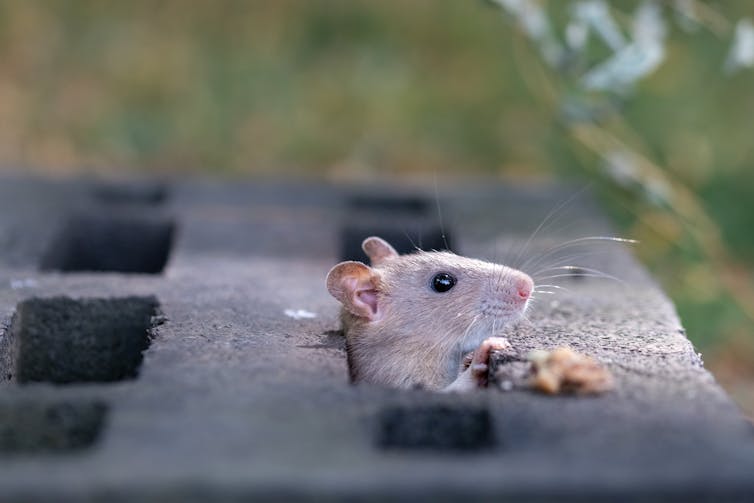[ad_1]
Rats have a considerably unlucky tendency to get pleasure from residing the place individuals dwell. That’s how a biologist tried to elucidate individuals’s hatred for the rodents in a tv information function about rats gnawing electrical cables in parked automobiles within the southern Swedish city of Malmö.
The brown rat, Rattus norvegicus, is without doubt one of the species greatest tailored to fashionable society. These rats have adopted people internationally to change into one of the vital ample mammals, spreading from their native distribution in northern China and Mongolia and reaching Europe within the 1500s, probably even earlier. Black rats, nonetheless, arrived in Europe as early as the first century AD.
At this time nearly all wild brown rats are synanthropic, that means they dwell in shut affiliation with people, consuming our leftovers and utilizing human constructions for shelter. The connection between rats and people is considered one of commensalism, a phrase derived from the Latin time period “commensal”, that means “consuming on the identical desk”.
All through the centuries, rats have been forged as humanity’s darkish shadow. Rats have had an unlimited influence on human civilisation, not least by the unfold of ailments. They’ve lengthy been related to filth, loss of life and destruction. In medieval Europe individuals loathed rats for his or her so-called brutishness, seemingly limitless sexual urge for food and fecundity. However their large numbers and adaptableness mirrors people’ evolutionary success.
They’ve unfold with wars and European imperialism to colonised territories within the Americas in addition to Africa and Australia. Rats thrive within the trenches of recent warfare even immediately.
A social and empathetic animal
Actual rats are removed from the despicable creatures they typically are made out to be. A number of research have proven that rats have highly effective empathy.
These animals can share the emotional state of others, which in psychology known as emotional contagion. Analysis has proven that when a rat sees one other rat in misery, the neural constructions activated in that rat’s mind intently resembles these activated in people brains when feeling empathy for ache of others.
One experiment confirmed that rats will launch a fellow rat from an disagreeable cage even when they don’t seem to be rewarded for it. And if given chocolate treats afterwards, the free rat would normally save at the very least one deal with for the previous captive.
This selfless behaviour comes from rats’ socially complicated lives in household teams of a number of generations. They type lifelong bonds with different rats and share socially realized abilities, comparable to foraging strategies, throughout generations. This implies rats have a type of tradition.
A examine from 2023 even confirmed that rats can think about locations and issues that aren’t in entrance of them on the time. In experiments rats had been proven to navigate an area of their ideas, that they’ve beforehand explored. As within the research of empathy, researchers demonstrated this by evaluating the areas within the rat’s brains that had been activated to people who are activated when people take into consideration navigating their approach by locations they’ve visited.
This capability to think about additionally means that rats have a way of previous and future.
Dwelling and dying with rats
With this in thoughts, human methods of coping with rats appear merciless. The commonest chemical technique for rat management is anticoagulants, which trigger deadly inside bleeding one to 2 weeks after a rat eats the poison. Since rats are each socially clever and cautious, they like to pattern unfamiliar meals after which wait to see if it makes them or different rats sick.
It’s referred to as poison shyness. With anticoagulants nonetheless, the time between consumption of the bait and the rat dying is so lengthy that they don’t normally affiliate it with their feeding habits.
The human motivation for studying about rats has typically been the will to kill them. The foremost specialists in wild rat behaviour are their exterminators. And but, present strategies for controlling wild rat populations are usually not very efficient.
Some rats have developed resistance to the poisons and are in a position to eat it and survive. Trapping them is notoriously troublesome, they usually typically recolonise the territory from which they’ve been eliminated.
World urbanisation might be solely going to carry people into nearer contact with rats, and killing rats the way in which it’s executed immediately isn’t moral.

TashaBubo/Shutterstock
As a substitute, we should always think about different methods, like those explored by the City Rat Mission on the College of Helsinki. Right here researchers from totally different disciplines are attempting to get a deeper understanding of conflicts between rats and people. They’re finding out each species and their interactions, in hope of a future with much less bloody human-rat relations.
The challenge has noticed that locations in city areas the place individuals feed birds have a tendency to draw rats as properly – which individuals then attempt to eradicate utilizing poison or traps.
Analysis has additionally prompt that with elevated information about rats and their behaviour individuals are inclined to develop a extra optimistic perspective in the direction of them. So extra information of untamed rats’ social behaviour is required. And people have to handle their very own behaviour to keep away from battle with rats.
A superb place to start out can be decreasing meals waste and cease leaving leftovers out unsecured. Much less rats round human meals sources, for instance, and extra information about their behaviour would imply a decrease threat of ailments spreading from rats to people, in addition to from people to rats.
Humanity’s future is with the rat, a social and empathetic animal. So it’s time we understood our shadows.
[ad_2]
Source link

